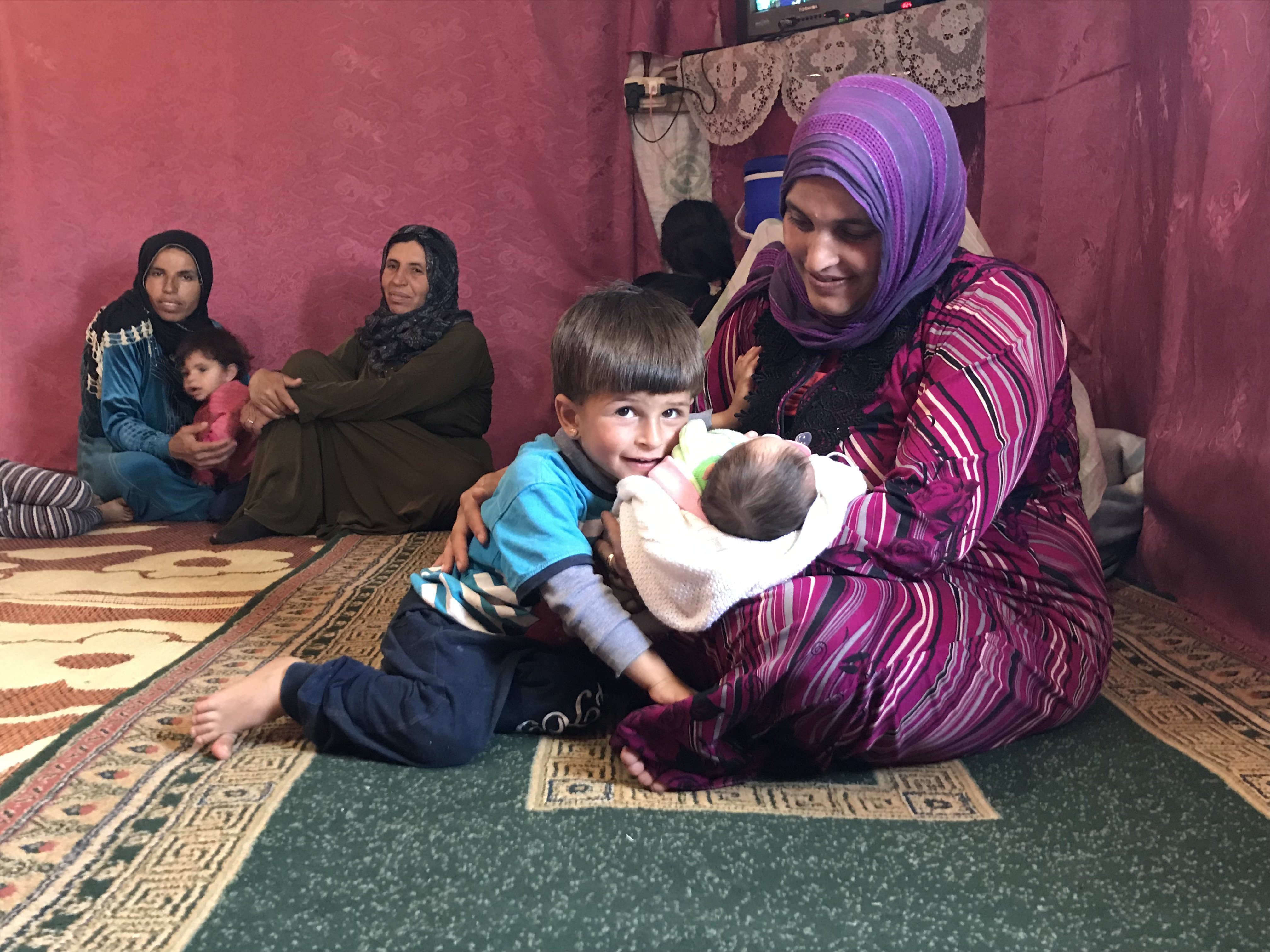After visiting Syrian refugees in Lebanon, Oxfam CEO Abby Maxman reflects on her trip and advocates for protecting the rights of Syrian refugees—starting here in the US.
Last week, several Oxfam executive directors and I traveled to Lebanon to see Oxfam’s ongoing work supporting Syrian refugees and Lebanese host communities who are deeply affected by the crisis in Syria. With so many emergencies and headlines competing for our attention, the violence and displacement in Syria and surrounding countries can sometimes fade into the background. But this trip was a grim reminder that the needs of Syrian families are as urgent as ever.
I spoke with Fatima and Jamal* outside their home in the Bekaa Valley. They have been in Lebanon since the beginning of the crisis and told me they had nowhere else to go. They were growing beautiful plants and herbs in their home—a physical sign they know they will be here long enough to put down roots. After years away from Syria, their hope that their lives will return to normal is dwindling. “We see no hope for going back to Syria—we don’t have a future to even be fearful of,” they said.

Syrian refugees in Lebanon rely on humanitarian aid for basics such as clean water, food, and health care. They want to work hard, feed their families, and live in peace, but these families are losing hope as the war drags on—they can feel the world’s attention shifting away. They want to feel safe, hopeful, and seen.
Oxfam’s programs in Lebanon provide humanitarian assistance to vulnerable people affected by this conflict, and we promote economic development, the promotion of good governance at a local and national level, and women’s rights through our work with our partners. We also work with local partners to empower marginalized women and men, including refugees, to meet their basic needs and uphold their basic rights in the face of current and future shocks.
Speaking with Syrian families in Lebanon, we were reminded of how diverse Syrians’ experiences and expectations are. One of the women I met is Amira*, 31, a mother who struggles to do everyday chores—such as cooking, cleaning, and laundry—without necessities such as diapers, milk, and cleaning supplies.

We heard repeatedly that Syrian refugees do not feel it’s safe to return home yet; it was described it as “a distant dream.” Even as the conflict stabilizes in much of Syria, fears of conscription and arrest are real, and in many areas basic services such as clean water, education, and health care are still not available.
As I listened to their stories, I knew that news rumbled at home of a potential end to the entire US Refugee Resettlement Program, and that a decision loomed about whether the US will extend Temporary Protected Status (TPS) for Syrians in the US.
Temporary Protected Status for some, not all
Here at home, Syrians with TPS have just had some positive news: They will maintain their status and continue to be protected for another 18 months. Unfortunately, Syrians in the US who do not already hold this status are not eligible to apply for the protection. It is a relief to hear that Syrians who are already protected can breathe easier, but it is confounding to hear–especially considering our recent conversations in Lebanon—that the same protection wouldn’t be extended to Syrians who flee the ongoing crisis.
A country receives TPS designation when conditions prevent people from returning home safely, or, in some cases, when the country is unable to absorb the return of large numbers of people. Such conditions include ongoing armed conflict due to war or violence, unsafe living conditions due to natural disasters such as earthquakes or hurricanes, or devastating health epidemics, such as the cholera epidemic in Haiti. In some countries, more than one of these conditions applies.
In extending protection to TPS holders, the US accepts responsibility for ensuring that these residents remain safe. When the program is terminated, TPS holders are put in a precarious situation. Forcing people to leave a secure home for countries where they are likely to face danger and incredible hardship negates the point of TPS.
The conflict in Syria has reached a new phase, but the future is still uncertain, and many Syrians still don’t feel safe to go home. The US government’s decision to protect some Syrians, but not others, is a disappointment and another sign that empathy and logic are missing from these policies.
Syrians in the US and elsewhere must continue to be protected. As families make difficult decisions and face immense challenges, refugees need to be supported to find safety now, and to make their own decisions about their futures.
Refugee Resettlement Program in danger
The Trump administration is considering a complete shutdown of the refugee resettlement program, which is a truly unthinkable and inhumane response to those who have been forced from their homes to seek safety and a chance to contribute in the United States. It runs completely counter to American values and our legacy as a welcoming nation.
Zeroing out refugee admissions would mean we no longer care about upholding human rights or protecting the most vulnerable. At a time of unprecedented global displacement, we must fight efforts to close our country’s doors to the world’s most vulnerable people. If the richest country in the world—which was founded by immigrants—doesn’t resettle refugees, who will step in to help?
We must continue this program to keep our promise to uphold human rights, but more importantly to extend a warm, helping hand to those who have lived through unimaginable fear and loss and now seek safety in the United States.
*Names changed for privacy

